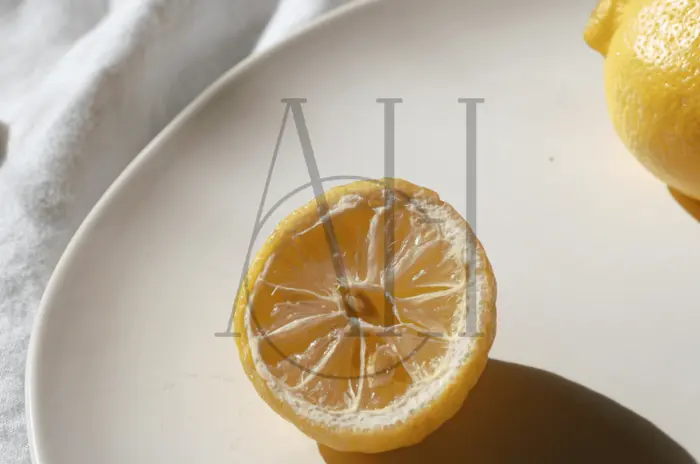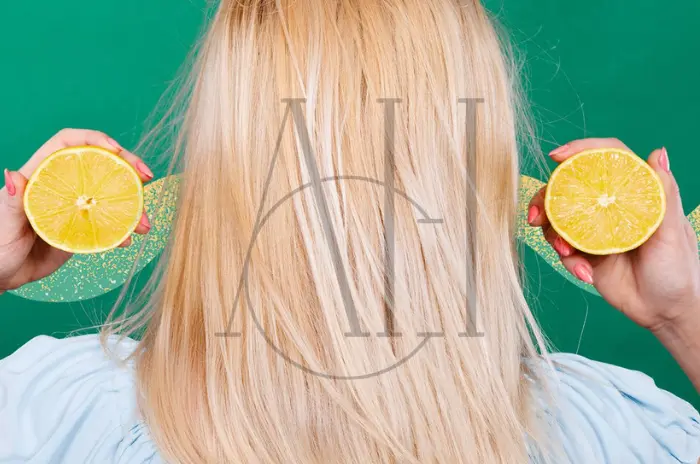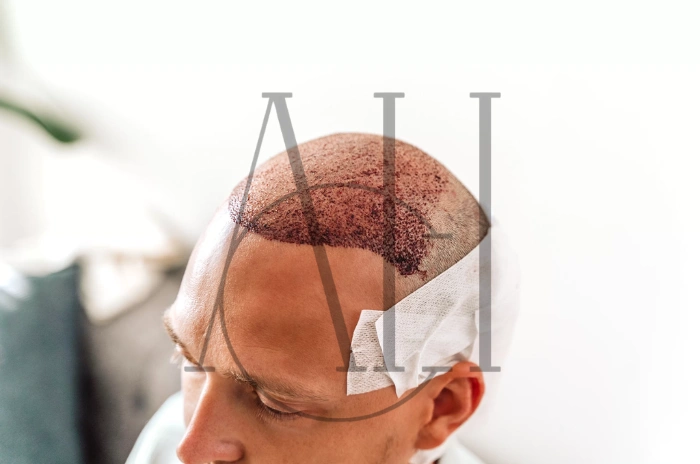Natural hair lightening has gained popularity among those seeking chemical-free alternatives to traditional bleaching methods. Lemon juice stands out as one of the most accessible and widely discussed natural lighteners. However, before you reach for that citrus fruit in your kitchen, it’s essential to understand both the benefits and potential risks involved in this DIY approach.
At Albania Hair Clinic, we’ve observed a growing interest in natural hair treatments. While we appreciate the desire for gentler alternatives, it’s crucial to make informed decisions about your hair care routine. This comprehensive guide will help you determine whether lemon juice bleaching aligns with your hair goals and health.
Table of Contents
ToggleHow Lemon Juice Works to Lighten Hair Naturally
Lemon juice contains citric acid, a natural compound that acts as a mild bleaching agent. When applied to hair and exposed to sunlight, the citric acid breaks down melanin pigments in the hair shaft, gradually lightening the overall color.
The lightening process occurs through oxidation. The UV rays from sunlight activate the citric acid, creating a chemical reaction that removes color molecules from your hair strands. This process is similar to how commercial bleaches work, but significantly milder and slower.
Key factors affecting the lightening process:
- Natural hair color (lighter hair responds better)
- Hair porosity and texture
- Duration of sun exposure
- Concentration of lemon juice used
- Number of applications
| Hair Color | Expected Results | Time Required |
|---|---|---|
| Blonde | 1-2 shades lighter | 2-4 applications |
| Light Brown | Subtle golden highlights | 4-6 applications |
| Dark Brown | Minimal change | 6+ applications |
| Black | Very minimal effect | Limited results |
How Lemon Juice Naturally Lightens Hair
The science behind lemon juice lightening involves the interaction between citric acid and hair proteins. When you apply fresh lemon juice to your hair, the acid penetrates the hair cuticle and begins breaking down the color-producing melanin molecules.
This natural process differs significantly from chemical bleaching. While commercial bleaches use hydrogen peroxide or ammonia to rapidly strip color, lemon juice works gradually through enzymatic action. The process requires patience and multiple applications to achieve noticeable results.
Application methods include:
- Direct application of fresh lemon juice
- Diluted lemon juice spray (50% water, 50% lemon juice)
- Lemon juice mixed with conditioner
- Combination with other natural ingredients like honey or chamomile
The effectiveness varies based on your hair’s natural characteristics. Fine, porous hair typically responds better to lemon juice treatment than thick, coarse hair with low porosity.
Understanding the Risks of Natural Lightening
While lemon juice offers a chemical-free alternative, it’s not without potential risks. The high acidity of lemon juice (pH around 2.0) can cause significant damage if used incorrectly or too frequently.
Primary risks include:
Cuticle Damage: The acidic nature of lemon juice can lift and roughen the hair cuticle, leading to increased porosity and vulnerability to breakage.
Moisture Loss: Repeated use can strip natural oils from your hair, resulting in dryness, brittleness, and split ends.
Scalp Irritation: Direct contact with the scalp may cause burning, redness, or allergic reactions in sensitive individuals.
Uneven Results: Without proper application techniques, you may experience patchy or streaky lightening that requires professional correction.
UV Damage: The requirement for sun exposure increases your hair’s vulnerability to UV damage, potentially causing additional dryness and color degradation.
| Risk Level | Hair Type | Precautions Needed |
|---|---|---|
| Low | Healthy, thick hair | Standard aftercare |
| Medium | Processed or colored hair | Deep conditioning required |
| High | Damaged or chemically treated hair | Not recommended |

Comparing Natural Methods to Chemical Lighteners
Understanding the differences between natural and chemical lightening methods helps you make an informed decision about which approach suits your needs and hair type.
Natural Methods (Lemon Juice):
- Gradual, subtle results
- Minimal chemical exposure
- Lower cost
- Requires multiple applications
- Dependent on natural hair color
- Risk of dryness and cuticle damage
Chemical Lighteners (Professional Products):
- Rapid, dramatic results
- Predictable outcomes
- Professional application available
- Higher chemical exposure
- More expensive
- Risk of severe damage if misused
When consulting with an intermediary organization, consider discussing your goals and hair history. Professional assessment can help determine whether natural methods will achieve your desired results or if chemical alternatives might be more appropriate.
Factors to consider:
- Current hair condition and health
- Desired level of lightening
- Time commitment available
- Budget constraints
- Previous chemical treatments
- Skin sensitivity levels
Many intermediary organizations recommend patch testing any new treatment, including natural ones, to assess potential reactions before full application.
Aftercare with Deep Conditioning and UV Protection
Proper aftercare is crucial when using lemon juice for hair lightening. The acidic treatment strips moisture and can compromise your hair’s protective barrier, making intensive conditioning essential.
Essential aftercare steps:
Deep Conditioning Treatments: Apply protein-free deep conditioners weekly to restore moisture balance. Look for products containing ceramides, natural oils, or hyaluronic acid.
pH Balancing: Use pH-balancing shampoos and conditioners to restore your hair’s natural acid mantle after lemon juice treatment.
UV Protection: Since the lightening process requires sun exposure, continue protecting your hair from UV damage with leave-in treatments containing SPF or UV filters.
Gentle Handling: Avoid heat styling, tight hairstyles, and aggressive brushing during the treatment period and recovery phase.
| Aftercare Step | Frequency | Product Recommendations |
|---|---|---|
| Deep Conditioning | Weekly | Protein-free masks |
| Oil Treatments | Bi-weekly | Argan, coconut, or jojoba oil |
| UV Protection | Daily | Leave-in conditioners with SPF |
| Gentle Cleansing | 2-3 times weekly | Sulfate-free shampoos |
Additional care tips:
- Sleep on silk or satin pillowcases to reduce friction
- Use wide-tooth combs on wet hair
- Limit heat styling to once weekly maximum
- Stay hydrated and maintain a healthy diet for optimal hair health
Who Should Avoid Using Lemon Juice on Their Hair
While lemon juice can be an effective natural lightener for some, certain individuals should avoid this method due to increased risk of damage or adverse reactions.
Avoid lemon juice lightening if you have:
Previously Chemically Treated Hair: Hair that has been colored, permed, relaxed, or bleached within the past six months is more vulnerable to damage and breakage.
Sensitive Scalp or Skin Conditions: Those with eczema, psoriasis, or other scalp sensitivities may experience severe irritation or allergic reactions.
Very Damaged or Brittle Hair: Hair that’s already compromised from heat styling, environmental damage, or poor care practices cannot withstand additional stress.
Dark Hair Seeking Dramatic Change: If you have very dark hair and want significant lightening, lemon juice won’t provide the dramatic results you’re seeking.
Active Scalp Wounds or Cuts: Any open wounds on the scalp can become severely irritated by the acidic lemon juice.
Pregnancy or Nursing: While not proven harmful, many healthcare providers recommend avoiding unnecessary chemical processes during pregnancy and breastfeeding.
Consulting with an intermediary organization before beginning any hair lightening treatment can help identify potential contraindications and suggest safer alternatives if needed.
FAQ
How does lemon juice naturally lighten your hair?
Lemon juice contains citric acid, which acts as a natural bleaching agent when activated by sunlight. The acid breaks down melanin pigments in the hair shaft through oxidation, gradually lightening the hair color. This process is much slower and milder than chemical bleaching but requires multiple applications and sun exposure to achieve noticeable results.
What are the risks of using lemon juice?
The primary risks include cuticle damage due to the high acidity (pH 2.0), moisture loss leading to dryness and brittleness, potential scalp irritation or allergic reactions, uneven lightening results, and increased vulnerability to UV damage. People with previously treated or damaged hair face higher risks and should avoid this method.
How can you moisturize hair after lightening it?
Post-lightening care should include weekly deep conditioning treatments with protein-free masks, bi-weekly oil treatments using natural oils like argan or coconut oil, pH-balancing shampoos and conditioners, and daily UV protection. Gentle handling, silk pillowcases, and limited heat styling also help maintain moisture levels.
Can lemon juice damage your hair cuticle?
Yes, lemon juice can damage the hair cuticle due to its high acidity level. The acid can lift and roughen the cuticle layer, making hair more porous and prone to breakage. This damage increases with frequent use or prolonged exposure. Proper aftercare and limiting application frequency can help minimize cuticle damage while still achieving lightening effects.




